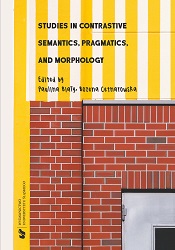Contrastive study of governed prepositions in Croatian, English, and French
Contrastive study of governed prepositions in Croatian, English, and French
Author(s): Daniela Katunar, Ida Raffaelli
Subject(s): Language studies, Language and Literature Studies, Theoretical Linguistics, Applied Linguistics, Semantics, South Slavic Languages
Published by: Wydawnictwo Uniwersytetu Śląskiego
Summary/Abstract: Governed prepositions are defined as prepositions in the relation of strong government with another lexical unit in a syntactic phrase, for example, a verb (believe in, rely on) (Rauh 1993; Hoffmann 2007; Gaszewski 2012). The relation of strong government makes prepositions obligatory complements of verbs and entails a semantic difference between verb senses with or without a preposition (Eng. believe someone – believe in someone; Cro. držati (što u ruci) ‘hold (something in hand)’ – držati do ‘appreciate; lit. hold to’; Fr. porter ‘put, wear’ – porter sur ‘to focus on’). It also entails a change in the meaning of a preposition and results in its extension from the basic spatial meaning, as in be in the box – believe in someone. It is therefore the aim of this study to examine the properties of governed prepositions in three structurally different languages – Croatian, English, and French.
Book: Studies in Contrastive Semantics, Pragmatics, and Morphology
- Page Range: 55-70
- Page Count: 16
- Publication Year: 2018
- Language: English
- Content File-PDF

